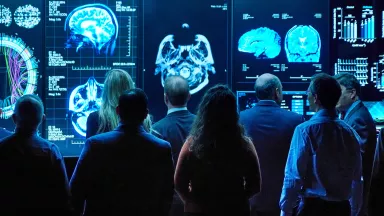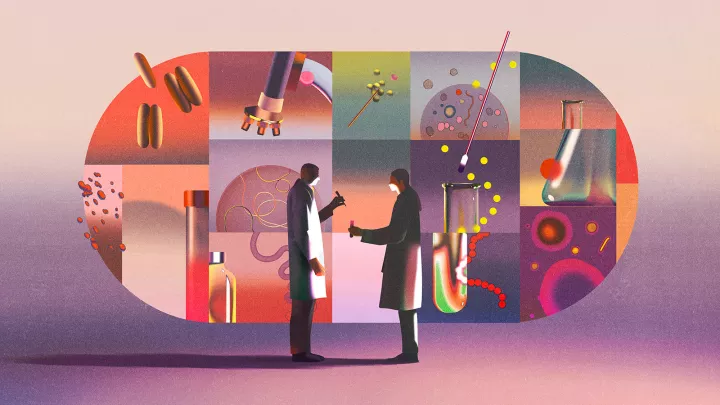Our Approach to Pediatric Neurological Disorders

Our institutional culture and founding generation of academic pioneers shattered preconceptions of neurodevelopmental disorders and created entirely new paradigms of thought, realms of nosology, pathogenic mechanisms, and interdisciplinary scholarship. Out of this intense cauldron of biomedical innovation emerged a cadre of international leaders in understanding child development and the origins of an exceptionally broad spectrum of afflictions affecting the developing brain and body. This precept is imprinted into our departmental philosophy of teaching, clinical activities, and research, emphasizing the concept of “neurologic disorders across the lifespan” viewed as dynamically changing processes allowing for novel theories of disease pathogenesis and innovative personalized medicine initiatives. Moreover, the breadth and scope of those biomedical innovations helped to populate our nation and the world with an extraordinary array of clinical care, teaching, research and psychosocial institutions that have revolutionized our understanding and care of individuals with developmental and intellectual disabilities and their evolving needs across the lifespan.
Our unique legacy continues to encompass a singular dedication to alleviating the suffering of patients and families often stigmatized by disorders of unknown provenance and unusual behaviors. From the founding of our Department and Division of Child Neurology, we have always enlisted the aid of talented and visionary scientists, inventors and clinicians, not traditionally found in academic health systems, to seek to understand normal and pathological processes of the developing brain and its lifelong trajectory when no previous template for discovery was available.
Virtually everything happening in child neurology worldwide is linked back to our seminal influence. Indeed, an unusually large proportion of our trainees and early stage faculty have gone on to create their own successful broad-based and unique programs throughout the nation and the world.
Our legacy in pediatric neurology has led to pioneering achievements that have given rise to decades of innovation that also resulted in our recognition as an international referral site for complex pediatric neurological cases. We are ranked in the top 1% of all hospitals in the nation for neurology and are one of “America’s Best Children’s Hospitals” according to U.S. News & World Report.
Empowering Children, Families & Caregivers
We know children are indispensable partners in the diagnosis and age-appropriate treatment of neurological disease. Our comprehensive, family-centered approach to care means that every parent and child is listened to and respected throughout the entire course of our carefully managed, precision care treatment plans. The doctors and support team within our division are also dedicated to educating and empowering each child’s extended care network and helping the entire family enjoy the highest quality of life possible.

Advanced Treatments
We diagnose and treat children using an interdisciplinary, team-based approach that includes the most advanced diagnostic, treatment, and technological modalities to optimize and sustain the optimal degree of neurological functioning to greatly enhance the quality of life. Our specialists utilize state-of-the-art neuroimaging and electrophysiological and other targeted neurodiagnostic technologies for precision diagnoses and to provide the broadest array of treatment options available for the full range of pediatric neurological disorders. Moreover, we are amongst the first institutions worldwide to offer revolutionary advances in gene therapy that have transformed the neurological functioning and survival of infants and children who previously carried the bleakest diagnoses possible. Through groundbreaking research pioneered at our institution, we are deeply committed to developing and implementing similar paradigm-shattering treatment options.
Specialty Centers
The Isabelle Rapin Division of Neurology at CHAM features programs and centers that specialize in the diagnosis and treatment of epilepsy, pediatric neuromuscular disorders, pediatric communication disorders, including autism spectrum disorders, Rett Syndrome, pediatric language disorders, speech and hearing impairments, neurocutaneous disorders, and a range of other common and rare pediatric neurological disorders.
Comprehensive Epilepsy Center (Pediatric Division)
The Comprehensive Epilepsy Center is recognized among the most elite epilepsy programs worldwide. Our team of pediatric epileptologists, numerous CHAM pediatric subspecialists, neurogenetics, neurophysiologists, neuroradiologists, neurosurgeons, neuropsychologists and neuropathologists collaborate extensively to devise the most advanced precision medicine diagnoses and relevant emerging interdisciplinary treatment options. These initiatives are greatly enhanced by a pioneering and state-of-the-art epilepsy monitoring unit with extensive, sophisticated and broad-based neuropsychological and neurosurgical services.
Center for Autism and Pediatric Communication Disorders
Our center is an international destination site for children and adults stigmatized for carrying an incorrect diagnosis of conditions of intellectual impairments.
Our inaugural center is an outgrowth of the unique vision of Dr. Isabelle Rapin, the department’s first pediatric neurologist and world authority on pediatric, genetic and metabolic disorders, and on the integrative concept of pediatric communications disorders. As a result of her pioneering clinical and research breakthroughs, we have built an innovative center that offers a novel and immersive environment for the comprehensive assessment of the range of neurological disabilities that comprise the core of these disorders. This includes determination of patients with different forms of autism spectrum disorders, primary pediatric language disorders, subtle impairments of speech and varying degrees of hearing disorders that span broad areas of the brain that process verbal cues into the appropriate neural network format for deciphering and generating intelligible language. It is only here that we meld recently emerging and explosive innovations in the neuroscience of communications networks with next-generation precision diagnostic and therapeutic technologies.
Our multidisciplinary team of leading experts—including renowned adult and pediatric neurologists, psychiatrists and neuropsychologists, among other cognitive specialists—offer state-of-the-art diagnostic services, including psychological, comprehensive as well as targeted neuropsychological evaluations. Our center is world-renowned for the development of unique cognitive and social skills interventions, delivered in individual, patient-centered or dynamic, group settings. Their efficacy has been highlighted in several books and manuals authored by Dr. Michelle Dunn. The center’s population is comprised of verbal individuals, ages five through adult, with autism spectrum disorders (ASDs); communication disorders; attention deficit hyperactivity disorder (ADHD); social anxiety disorder; and other comorbid disorders and developmental disabilities, along with their families. We are among the highest-performing centers in the nation for neurology, according to U.S. News & World Report, and we are an international referral site for the most complex cases.
Our ground-breaking research initiatives, partnerships with Greater New York metropolitan school districts and colleges (where contracted programs to empower teachers greatly expand the reach of our interdisciplinary interventions), as well as disease foundations have established Montefiore Einstein as a thought leader and steward of the latest and most advanced treatments and technologies for these disorders.
Our singular dedication to alleviating the suffering of patients and families has spurred the genesis of a unique set of disease-modifying interventions (Advanced Therapeutics) designed to allow patients to recapture the essence of their true selves.
Neuromuscular Center
The Montefiore Einstein Division of Neuromuscular Medicine and our Muscular Dystrophy Association Center were among the first of their kind in the nation to treat the full spectrum of neuromuscular diseases occurring from early infancy through late adulthood. We specialize in disorders of the peripheral nerves, muscles, and neuromuscular junctions, including traumatic nerve injury; peripheral and toxic neuropathies; motor neuron disorders, such as amyotrophic lateral sclerosis (ALS or Lou Gehrig’s disease); neuromuscular junction disorders, such as myasthenia gravis; all forms of muscular dystrophy, mitochondrial and encephalopathies; as well as many additional rare and complex conditions.
The Saul R. Korey Department of Neurology defined the field of neurotoxicology, including the classification of a broad spectrum of unique neurological disorders. We also established the biological underpinnings of many of these disorders and were the leading international experts in investigating and uncovering the consequences of major industrial accidents and other environmental influences on neurologic disabilities.
We are an internationally recognized leader in the field of neuromuscular medicine, dedicated to advanced clinical evaluation, interdisciplinary care and research of neuromuscular disorders. We are among the highest-performing centers in the nation for neurology, according to U.S. News & World Report, and have one of the best residency and fellowship training programs worldwide.
Our world-renowned experts utilize the latest, revolutionary advances in gene therapy and other state-of-the-art therapeutic approaches to optimize neurological function and quality of life, including enabling floppy babies to take their first steps.
Neurocutaneous Center
The Montefiore Einstein Neurocutaneous Center is one of the leading global destination sites for the management of neurocutaneous disorders, including tuberous sclerosis complex, neurofibromatosis, schwannomatosis, Sturge-Weber syndrome, Von Hippel-Lindau disease, ataxia-telangiectasia, neurocutaneous melanosis, incontinentia pigmenti, and hypomelanosis of Ito, among others, in children and adults. Neurocutaneous disorders are genetic conditions that affect the nervous system and skin, as well as most other organ systems, including the eyes, heart, blood vessels, lungs, kidneys, endocrine glands and bones. They have a variety of clinical manifestations, from cataracts and hearing loss to seizures, developmental disabilities, skeletal deformities, and tumors.
Our multidisciplinary team of world-renowned experts utilizes the latest and most advanced technology to provide comprehensive, personalized care, address the diverse needs of individual patients and their families, and prevent and minimize deformities while optimizing function and quality of life. We are also an international referral site for complex neurocutaneous disorder cases and are among the highest-performing centers in the nation for neurology, as well as one of the nation’s top-rated children’s hospitals, according to U.S. News & World Report.
Our specialized team of experts is comprised of a wide range of specialists including neurologists, neuro-oncologists, neurosurgeons, pediatricians, ophthalmologists, orthopedic surgeons, audiologists, dermatologists, neuropsychologists, epileptologists, nephrologists, physical, occupational and speech therapists, and geneticists, among others, who collaborate to offer unmatched expertise in addressing the complex needs of individual patients and their families. Our center is part of the Tuberous Sclerosis Alliance and Neurofibromatosis Network and is actively involved in community outreach programs for tuberous sclerosis and neurofibromatosis.
Tri-State Rett Syndrome Center
The Montefiore Einstein Tri-State Rett Syndrome Center is an international leader and the largest center in the United States, as well as the only center in the tri-state area, focused exclusively on the diagnosis and treatment of Rett syndrome and other Rett/MECP2-related disorders, as well as CDKL5 Deficiency Disorder and FOXG1 syndrome, in children and adults. We are among an elite group of 18 International Rett Syndrome Foundation (IRSF)-designated Centers of Excellence in the nation, providing best-in-class clinical care and leading research and clinical trials to expand the possibilities of treatment for individuals with Rett syndrome.
Our multidisciplinary team of world-renowned experts are thought leaders at the forefront of Rett syndrome care, research and education. We utilize the latest and most advanced technologies to provide comprehensive personalized care and address the complex and diverse needs of individual patients and their families to dramatically alter the trajectory of their interpersonal communication skills development and thus profoundly expand their inner voice and ability to engage in rewarding relationships. We are an international referral site for complex Rett syndrome cases and are among the highest-performing centers in the nation for neurology, as well as one of the nation’s top-rated children’s hospitals, according to U.S. News & World Report.
Those with Rett syndrome, a rare genetic neurodevelopmental disorder affecting mostly girls, often present with a broad spectrum of symptoms, including impaired speech, cognitive and motor abilities, seizures, gastroesophageal reflux, constipation, scoliosis, as well as difficulties with learning, heart function, sleep, breathing, chewing, swallowing and digestion. Our interdisciplinary team is comprised of pediatric neurologists, pediatricians, physiatrists, psychiatrists, neuropsychologists, sleep medicine specialists, gastroenterologists, cardiologists, pulmonologists, urologists, orthopedists, epileptologists, endocrinologists, dentists, neuroradiologists, neurogeneticists, voice and swallow pathologists, nutritionists, and physical, occupational, and respiratory therapists, among others, who collaborate to address the complex needs of each patient and their families.
Our center was born out of the optimism derived from scientific findings that even severe symptoms of Rett syndrome can be reversed and our belief that these experimental results will translate into effective treatments and cures. We are committed to advancing scientific discoveries and innovation through continued Rett syndrome research. Investigational therapies are also offered through our clinical trials, which can provide access to emerging treatments that are otherwise unavailable.
We prioritize and lead educational efforts and support for patients, caregivers, family members, healthcare providers and the community, and we continue to develop and maintain programs, classes, research, and educational symposia that contribute to our understanding and management of Rett syndrome. We are also the central organizer of the Blue Sky Girls—a groundbreaking international, multi-site, annual event designed to increase public awareness of Rett Syndrome.

About Pediatric Neurological Conditions
Neuromuscular Disorders
Neuromuscular disorders are a group of diseases that affect the peripheral nervous system. The motor and sensory nerves that connect the spinal cord and the brain to the rest of the body make up the peripheral nervous system, and neuromuscular disorders present symptomatically as progressive muscle weakness.
Muscular Dystrophy
One common neuromuscular disease is muscular dystrophy (MD). MD refers to a group of more than 30 genetic diseases that cause progressive weakness and degeneration of skeletal muscles used during voluntary movement. These disorders vary in age of onset, severity and pattern of affected muscles. All forms of MD grow worse as muscles progressively degenerate and weaken. Many individuals eventually lose the ability to walk. Respiratory and cardiac diseases may occur, and some people may develop a swallowing disorder. MD is not contagious and cannot be brought on by injury or activity.
Headache Disorders
Headache disorders originate in the nervous system. They are one of the most common disorders, and are sometimes associated with other conditions.
Headaches are often a secondary symptom of a sleep disorder. For example, tension-type headache is regularly seen in persons with insomnia or sleep-wake cycle disorders. Nearly 75 percent of individuals who suffer from narcolepsy complain of either migraine or cluster headache. Migraines and cluster headaches appear to be related to the number of transitions between rapid eye movement (REM) and other sleep periods an individual has during sleep. Hypnic headache awakens individuals mainly at night but may also interrupt daytime naps. Reduced oxygen levels in people with sleep apnea may trigger early morning headaches.
Epilepsy
Epilepsies are chronic neurological disorders frequently affecting children and adolescents more than any other age groups. Symptoms may include involuntary movements, sensation, emotions or behaviors that can be associated with loss of awareness. Epilepsy has different causes, different seizure types and impact on individuals.
Learn More About Pediatric Neurologic Condition Screening, Prevention & Treatment
Find Isabelle Rapin Division of Child Neurology Locations
We have more locations than ever to help your family with the diagnosis and treatment of neurological conditions impacting children.

Montefiore Einstein Hutchinson Campus
Montefiore Einstein Advanced Care
















